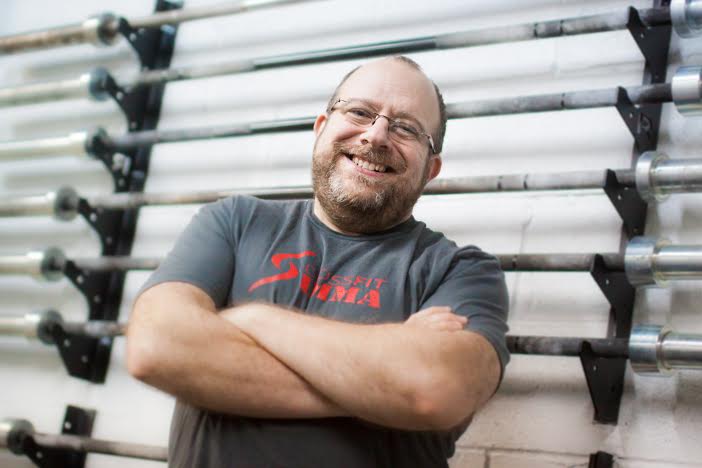Reporter Phil Gutis reflects on the seemingly widespread disbelief that anyone diagnosed with a cognitive disease can be a productive, contributing member of society — and the reality check society should be ready for.
A few weeks ago, my husband Tim and I were sitting at our kitchen counter, chatting over dinner and looking through the day’s mail. I was flipping through a local garden center brochure and reached the hardscaping section. I asked Tim how much he thought it would cost to redo our back deck with a more attractive stone.
Tim gave me a number and I filed it away and we moved on. It wasn’t until the next morning when I opened the back door to let our dogs out and saw that our back deck had mysteriously transformed from cracked concrete to stone. My first thought was how in the world did Tim get that done overnight? My second reaction was a face slap as I suddenly remembered we had had the deck redone about two years ago.
I mention this story only to prove that, yes, five years after an early-onset Alzheimer’s diagnosis, my mind is still not the best, even though I operate fairly well on a day-to-day basis. In fact, I’ve started doing some freelance proofreading and editing and am feeling like an increasingly productive member of society once again. I truly feel like I’m living with Alzheimer’s, as opposed to letting the disease control and define me.
I attribute the slow pace of my decline to the controversial drug Aduhelm. I’ve been part of clinical trials for the drug for most of the last five years. I have watched with delight as the Food and Drug Administration approved the drug in June of 2021 — and then with dismay as the federal agency that controls Medicare and Medicaid recently issued its final decision not to cover the cost of the drug.
(In February 2024, Biogen took Aduhelm off the market indefinitely.)
I could fill a book about the Aduhelm rollercoaster, and I’m sure somebody someday will write that story. But that’s not what I’m writing about today. Instead, I’m going to tackle another topic – the changing face of Alzheimer’s and the seemingly widespread disbelief that anyone diagnosed with a cognitive disease can be a productive, contributing member of society.
In fact, given the earlier and earlier methods of detection of brain disease, the face of Alzheimer’s is changing. Soon, the stereotypical picture of a person, usually a woman, sitting in a wheelchair or nursing home, clearly under great distress, will wane as younger and younger people receive the unwelcome news that there is something terrible brewing in their brains.
The stereotype, however, persists. In much of the world’s mind, people living with dementia are incapable of self-expression from the moment of diagnosis. This was demonstrated to me in one of the comments I posted in the New York Times about the-pending CMS decision. My comment wasn’t anything complex or anything. In fact, here’s what I wrote:
I am a 60-year-old man who has been living with an Alzheimer’s diagnosis for five years and have been part of the Aduhelm clinical trials.
I realize that one individual living with the disease is little more than an anecdote but I truly believe that Aduhelm has significantly slowed the development of my disease. And I have friends living with the disease who have had similar favorable experiences with Aduhelm.
But what I would most like to ask the Times and the policy makers is why no one is comparing the development of Aduhelm with handling of cancer drugs and accelerated approval by the FDA and then subsequent coverage by Medicare.
My layman’s understanding is that there have been dozens (or hundreds) of cancer drugs, some very very expensive and very dangerous, that have been approved by the FDA under accelerated approval processes then covered by Medicaid and Medicare.
Why is Alzheimer’s being treated any differently?
My comment got a few recommendations and some other Times readers added their own thoughts. One, in particular, angered me and demonstrates how people view those of us living with a cognitive disease. It came from a self-identified physician in Florida.
No offense, but as a practicing physician, I find your letter very well written for someone with a cognitive disease.
When I read that response, I nearly blew up with anger. A physician, after all, should know better and realize that improvements in detection through positron emission tomography scans and soon blood tests or eye exams will enable us to diagnose people with cognitive diseases long before we become that stereotypical elder in a nursing home.
So to my doctor friend in Florida and all the other folks out there who think Alzheimer’s is an immediate death sentence, I’m writing – yes, writing – to say that, caught early enough, there’s still much life to live post diagnosis. We now have an FDA-approved treatment to slow cognitive decline and many more on the way to give people living with this diagnosis more time to love, to work, to participate, to contribute.
To live. And what a gift that is.
Phil Gutis is a former New York Times reporter and current Being Patient contributor who was diagnosed with early onset Alzheimer’s. This article is part of his Phil’s Journal series, chronicling his experience living with Alzheimer’s and his participation in the aducanumab clinical trial.
UPDATE: 3 March 2024, 9:05 P.M. ET. In February 2024, Biogen took Aduhelm off the market, citing financial concerns. Although the drug did receive accelerated, conditional FDA approval for the treatment of early Alzheimer’s disease in 2021, it is no longer available to new patients. The company announced it would sunset trials in May 2024 and cease supplying the drug to current patients in November 2024.




We need substantial evidence of any med or a practice to slow this ALZ.
Good for you! I love this article. Even when my parents were in the late stages of dementia, we tried to normalize life as much as we could, doing and enjoying many of the things we always had. People don’t realize this but there is still much joy to be had. I wish you joy.